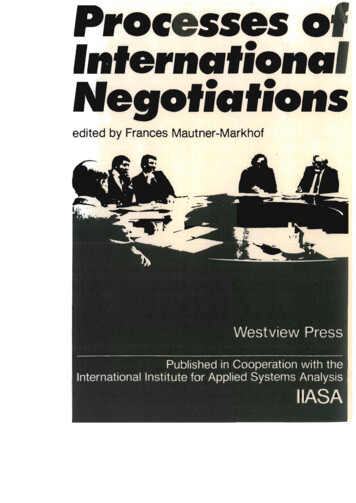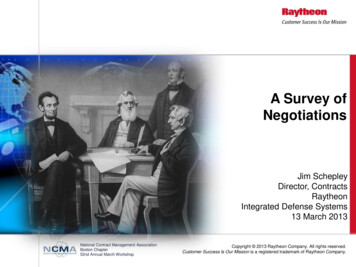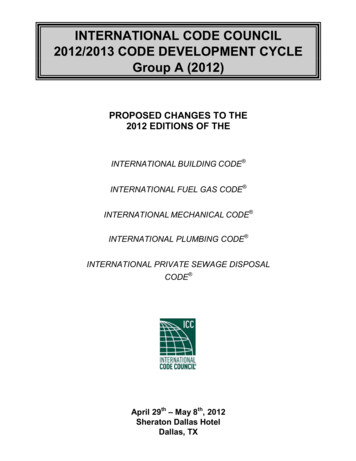
Transcription
Processes 01InternationalNegotiationsedited by Frances Mautner-Markhof
Processes ofInternational Negotiations
THE INTERNATIONAL INSTITUTE FOR APPLIED SYSTEMS ANALYSISis a nongovernmental research institution bringing together scientists from aroundthe world to work on problems of common concern. Situated in Laxenburg, Austria,nASA was founded in October 1972 by the academies of science and equivalentorganizations of twelve countries. Its founders gave nASA a unique position outsidenational, disciplinary, and institutional boundaries so that it might take the broadest possible view in pursuing its objectives:To promote international cooperation in solving problems from social, economic,technological, and environmental changeTo create a network of institutions in the national member organization countriesand elsewhere for joint scientific researchTo dellelop and formalize systems analysis and the sciences contributing to it, andpromote the use of analytical techniques needed to evaluate and address complexproblemsTo inform policy advisors and decision makers about the potential application of theInstitute's work to such problemsThe Institute now has national member organizations in the following countries:AustriaThe Austrian Academy of SciencesBulgariaThe National Committee for AppliedSystems Analysis and ManagementHungaryThe Hungarian Committee forApplied Systems AnalysisItalyThe National Research CouncilCanadaThe Canadian Committee for nASAJapanThe Japan Committee for IIASACzechoslovakiaThe Committee for nASA of theCzechoslovak Socialist RepublicNetherlandsThe Foundation IIASA-NetherlandsFinlandThe Finnish Committee for IIASAFranceThe French Association for theDevelopment of Systems AnalysisGerman Democratic RepublicThe Academy of Sciences of theGerman Democratic RepublicFederal Republic of GermanyAssociation for the Advancementof IIASAPolandThe Polish Academy of SciencesSwedenThe Swedish Council for Planningand Coordination of ResearchUnion of Soviet Socialist RepublicsThe Academy of Sciences of the Unionof Soviet Socialist RepublicsUnited States of AmericaThe American Academy of Artsand Sciences
Published in Cooperation with theINTERNATIONAL INSTITUTE FORAPPLIED SYSTEMS ANALYSISCIIASALaxenburg, Austria
Processes ofInternational NegotiationsEDITED BYFrances Mautner-MarkhofWestview PressBOULDER, SAN FRANCISCO, & LONDON
This Westview softcover edition is printed on acid-free paper and bound in softcovers that carry thehighest rating of the National Association of State Textbook Administrators, in consultation with theAssociation of American Publishers and the Book Manufacturers' Institute.All rights reserved. No part of this publication may be reproduced or transmitted in any form or byany means, electronic or mechanical, including photocopy, recording, or any information storage andretrieval system, without permission in writing from the publisher.Copyright 1989 by the International Institute for Applied Systems Analysis, Laxenburg, Austria, withexclusive world distribution rights held by Westview Press, Inc.Published in 1989 in the United States of America by Westview Press, Inc., 5500 Central Avenue,Boulder, Colorado 80301, and in the United Kingdom by Westview Press, Inc., 13 Brunswick Centre,London WCI N IAF, EnglandLibrary of Congress Cataloging-in-Publication DataProcesses of international negotiations.I. Pacific settlement of international disputes.2. Diplomatic negotiations in international disputes.I. Mautner-Markhof, Frances.JX4473.P33 1989341.5'288-33890ISBN 0-8133-7721-8Printed and bound in the United States of America § 10The paper used in this publication meets the requirements of the American National Standardfor Permanence of Paper for Printed Library Materials Z39.48-1984.98765432
PrefaceNegotiations are essential mechanisms for the peaceful resolution of disputes andfor maintaining stability in international relations. Negotiations can and shouldcontribute to predictability, equity, and security among states. In achievingthese goals, negotiations become important confidence-building measures.The increasing role of negotiations and of international organizations formanaging the system of international order and for pursuing/achieving states'interests/policies through peaceful means has produced a fundamental evolutionin the agenda, functions, and intensity of international negotiations.In the view of both researchers and negotiators over the recent past, thenegotiations process that is organized along traditional lines is becoming morecomplex, difficult, and less effective. The processes of negotiations are in generaltaking more and more time and lagging behind the evolution of the internationalenvironment. Not only are the issues themselves more complex, but also, in theimplementation of any agreements reached, the resolution of the issues involvedwill need to take place over a longer time and therefore to be managed jointly ormultilaterally.Because of the increasing complexity of issues and the fast pace of changesaffecting both national and international interests, it has become essential forinternational agreements to contain sufficient flexibility in certain of their provisions to permit dealing with uncertainty and the needs of the parties to adapt tonew and changing circumstances. In this sense, international negotiations andagreements must be not only reactive but also anticipatory.These considerations indicate that a much-needed approach is one which isconcerned specifically with bringing about a multinational, multicultural, andmultidisciplinary understanding of and perspective on international negotiationsand which also bridges the gap between practitioners and researchers.A specific objective and unique aspect of the nASA Project on theProcesses of International Negotiations (PIN Project), which started in April1986 and was funded by the Carnegie Corporation, is the international, multidisciplinary approach brought to bear on all of the Project's activities. This wasespecially evident at the nASA Conference on the Processes of InternationalNegotiations, held in May 1987. The PIN networks in nASA's member countriesplayed an essential role in this Conference. To keep the focus of the work onsubstantive issues and on relevant applications-oriented results, while taking intoaccount the importance and impact of different cultural and political systems inthe various national approaches to negotiations, both practitioners and
viPre/auresearchers involved in the processes of negotiations made presentations at thePIN Conference and took part in the panel discussions. These presentationsform the basis for the chapters of this book.The goals of the Conference were to foster increased communication andunderstanding between practitioners and researchers and among variousresearch disciplines, to present and discuss research results, and to identify possible future research activities. The participation and interaction of both highlevel negotiations practitioners and researchers were considered especially valuable and unique aspects of the Conference.All of the subjects dealt with at the Conference have direct and obviousrelevance to improving negotiations outcomes on, and the ability to dealeffectively with, such issues as the transboundary effects (environmental,economic, etc.) of technological risk, security and confidence-building measures,and international economic cooperation - all of which are high on the negotiations agenda of many countries.Laxenburg, AustriaNovember 1988Frances Mautner-Markhof
ContentsPrefacevIntroduction1I.The Role of International Organizations and OtherMultilateral Mechanisms1.Toward an Integral Analysis of International NegotiationsJ. Kaufmann (Netherlands)2.3.4.5.6.7.8.7Increasing the Role of International Negotiationsand International OrganizationsA. V. Serguiev (USSR)15Multilateral Negotiations: The Role of Presiding OfficersW. Lang (Austria)23The CSCE as a Collaborative OrderE. Antola (Finland)43Developing a Global Negotiating MachineryG.K. Yefimov (USSR)55International Negotiations:Mechanisms for the Management of Complex SystemsF. Mautner-Markhof (IIASA//AEA)65Experiences of a Negotiator at the Stockholm ConferenceK. Citron (Federal Republic of Germany)79From Negotiations to ConsultationsR. Kloepzig and V. A. Richardson (UN/DO)85
ConhnhviiiII.International Trade Negotiations9.Joint Ventures: Joint Interests in East-West Trade?U. Kivikari (Finland)109Interaction between the Theory and Practice of Trade Negotiations:Experiences and Proposals of a PractitionerG. Vlachoutsicos (USA)117Conceptions of the Trade Negotiation ProcessS.B. Lundstedt (USA)131International Joint Venture NegotiationsF.F. Heimann (USA)153Hungary's Accession to GATTJ. Nyerges (Hungary)161International Multiparty Negotiation:The Electrolux-Zanussi CaseP. Gennaro (Italy)175How to Negotiate for Joint VenturesG.A. Wolf-Laudon (Austria)17910.11.12.13.14.15.III.Cultural, Psychological, and Political Factorsin International Negotiations16.Cultural Predictors of National Negotiation StylesG. Hofstede (Netherlands)193Culture as a Factor in International Negotiations:A Proposed Research Project from a Psychological PerspectiveY.H. Poortinga and E.G. Hendriks (Netherlands)203New Political Thinking and International NegotiationsS.L. Kambalov (USSR)213The Role of Forecasting International Relationsin the Process of International NegotiationsP. Pantev (Bulgaria)219Negotiations in Our TimeH. Grunert (German Democratic Republic)22717.18.19.20.
CorIUm.ixIV.Theoretical Foundations and Methods of Analysis -21.International Negotiation: A Process Worthy of ReexaminationM. Merle {France}233In Search of Common Elements in the Analysis of theNegotiation Process1. W. Zartman {USA}241International Negotiations and Cognitive Theory:A Research ProjectC. Jonsson {Sweden}257The System of International Negotiations and Its Impacton the Processes of NegotiationV.A. Kremenyuk {USSR}277Paradigms in International Negotiation:The Example of "Good Faith"A. Plantey {France}287Synthesizing Themes of the US-PIN ProgramH. Raiffa and J.K. Sebenius {USA}29322.23.24.25.26.1V.Theoretical Foundations and Methods of Analysis -227.Effective Formation of International Concord for Conflict Solving:A Game Theoretic Approach with Risk AssessmentF. Seo and M. Sakawa {Japan}30328.On the Time Aspect of International Negotiations and the Probabilityfor Reaching an Agreement: An Incomplete Information ApproachW. Guth and R. Selten {Federal Republic of Germany}31929.Some Methodological Problems of Modeling International NegotiationsM.A. Khroustalev {USSR}33330.Frameworks for Rational Decisions and Conflict CoefficientsA.P. Wierzbicki {Poland}341Aspirations and Aspiration Adjustment in Location GamesW. Albers {Federal Republic of Germany}359Tools for Cooperative Negotiation between Two Departmentsof a Large Corporation: Cultural and Strategic AspectsA. David {France}39331.32.
Contentlx33.34.35.36.A Computer Network-Based Teleconferencing Systemto Enhance the Effectiveness of Multilateral Negotiations ForaV.F. Pryakhin (USSR)403The Mediator as a Third NegotiatorG.-D. Faure (France)415On Getting Simulation Models Used in International Negotiations:A Debriefing ExerciseL. Mermet and L. Hordijk (IIASA)427Dynamic Solution of a Two-Person Bargaining ProblemP. Bronisz and L. Krus (Poland)449VI.Training for International Negotiations37.Negotiations for Results: How to Develop Related Executive SkillsP.L. Bontadini (Italy)459Training in International Negotiating: A Learning InstrumentW.F.G. Mastenbroek (Netherlands)46938.VII. International Negotiations on Development andEnvironmental Issues39.40.41.42.Negotiating a Research Project on Negotiation:The Fixed Link (Transchannel) PrenegotiationsC. Dupont (France)481Report of the US Environment and Natural Resources Task GroupProgram on the Processes of International Negotiations (USA)495The Politics of Ozone: What Determines National Policies Towardthe Protection of the Ozone Layer?T. Vaahtoranta (Finland)507An Experimental System Supporting Negotiation on aJoint Development ProgramP. Bronisz and L. Krus (Poland)519Appendix A: List of Participants531Appendix B: Summary of the IIASA Conference on the Processesof International Negotiations537
IntroductionEfforts to understand and improve international negotiations will increasinglyhave to take into account the complexity and unpredictability of such negotiations and of the systems in which they are embedded. The reasons for this arethe impact of interdependence and globalization, and the fact that real systemsare becoming more complex.It is no longer sufficient to treat dynamic complex systems by disaggregation into components which are more accessible for analysis, with subsequentlinear superposition. This approach may no longer suffice for the adequate andcoherent comprehension, representation, and management of complex systems.Not only is the whole greater than the sum of its parts, but it is usually different- and in critical ways.Complexity is associated with information which we need but do not have- thus the role of information is essential for dealing with complex processesand for discerning underlying patterns.It is necessary to consider the processes associated with international negotiations in the context of their cultural and political environments. Negotiationsare dependent not only on the system in which they are embedded but also onthe various perceptions of those involved. Thus, it is important to identify anddeal with the impacts of cultural, political, and psychological factors on international negotiations.The viability and dynamic stability of a complex social system depends onits capability for innovation and adaptation. The mechanisms for achievinginnovation and adaptability will depend increasingly on effective internationalcooperation and negotiations, based on reliability, sufficiency, and confidence incommunication.Negotiations are essential mechanisms for maintaining dynamic stability,which depends on achieving an optimal balance between the options and constraints available to the system and its parts. Cooperation will be necessary foridentification of and agreement on changes in options and constraints. Whenthese are not arrived at cooperatively, crises and instabilities may result.Negotiations enhance the capability of a system to deal with uncertainty,unpredictability, uncontrollability, and disputes. International negotiations provide the means for developing innovative approaches for political, legal, institutional, technological, environmental, and economic issues and disputes.
2IntnxluctionInternational negotiations have become an integral factor in internationalrelations, and in some cases have achieved an ongoing or longer-term characterwhich reflects their increasing role in maintaining international stability and inresolving trans-boundary problems and disputes. The rapid pace of technological change has had and will continue to have a critical impact on the development and stability of international and national systems. Therefore, negotiationsprocesses and the resultant agreements should contain sufficient flexibility todeal not only with actual and imminent disputes, but also with technological andother changes and surprise, and must therefore be not only reactive but alsoanticipatory.In the analysis and understanding of the processes of international negotiations, a distinction can be made between approaches based on assumed strictlyrational behavior, on the one hand, and the problem-solving adaptive approacheswhich recognize the limits to rationality, on the other. Knowledge of thesuccesses and limitations of the various analytical methods and models is necessary to understand and structure problems more effectively and to evaluate moreefficiently complex alternatives. When dealing with systems and processes whichare highly complex and interdependent, and where there are limits on the capacity to acquire, process, and disseminate the necessary information, there aremany aspects which are more amenable to the problem-solving approach. In thereal world, the actual situation may not permit the attainment of preferred goals,but rather the objective may have to be a sufficient outcome - or even sheersurvival.The need to deal with the totality, diversity, and unpredictability of international negotiations requires a multidisciplinary, international, and crosscultural approach. The Proceedings of the Conference on the Processes of International Negotiations, organized by the IIASA Project on the Processes of International Negotiations, which was funded by the Carnegie Corporation, representa cross section of papers from practitioners and researchers from various disciplines, countries, cultures, and backgrounds. These papers deal with the role ofinternational organizations and other multilateral mechanisms, theoreticalapproaches and analytical methods, cultural and political factors, and actualexperiences on international security, nuclear safety, international economiccooperation, and environmental issues. In their breadth and depth they offervarious approaches for dealing with complexity and unpredictability in orderbetter to understand and improve the processes of international negotiations.International organizations and other multilateral mechanisms havebecome increasingly important for resolving disputes, for dealing with actual orpotential crises and risks, and for creating and maintaining international systemsand regimes. The processes of international negotiations in international organizations and other multilateral fora are characterized structurally by the increasing interdependence of states and negotiating fora and by the shift from a bipolarto a diversified or multipolar world order. They are characterized functionallyby the increasing importance of economic as opposed to military power, and oftechnological and other innovation as opposed to the sheer production of goodsand commodities.
Introdudion3Thus, the role of international organizations and other multilateralmechanisms is studied to see if their capabilities match, or could be made tomatch, the complexity and scope of the actual and emerging issues and the needsof the potential sides involved, and to assess the nature and characteristics whichinternational problem-solving mechanisms should have.International economic cooperation, and in particular East-West joint ventures, are increasingly important areas for international negotiations. They provide new dimensions and mechanisms for improving peaceful relations amongstates by enhancing their capability to deal with the needs and problems of international trade and economic development and the increased interdependencewhich characterizes the global economy. Joint ventures may thus represent theforward edge of an enhanced international modality not only of East-West andNorth-South economic cooperation, but also of international financing.East-West joint ventures have emerged not only as a form of internationaleconomic cooperation but also as an expression of new market-oriented economicmechanisms. Such modes of cooperation can play an important role, but onlywhen key issues have been studied, problems resolved, and mutual understandings achieved on critical aspects of joint ventures, such as the purposes of a jointventure, legal issues, ownership and control, management and operation, laborpolicy, financial issues, and dispute settlement mechanisms.International negotiations are, by definition, intercultural, and many of theproblems in such negotiations arise from fundamental cultural, political, andpsychological differences. The environment and culture of negotiators arereflected in certain "negotiating styles" and perceptions whose importance hasled to an increasingly intensive study of sociopolitical and other culture-basedand observer-dependent factors. These factors include political culture; attitudestoward cooperation, conflict, compromise and the use of third-parties; and theconcepts and role of sovereignty.Theoretical foundations and methods of analysis span a wide spectrum.Negotiations can be treated as part of a larger system, or as an object and process in itself, to achieve specific political, economic, or other aims. A negotiationas such can be studied from various points of view, e.g., as an exercise in communication, decision making, conflict management, or dispute resolution. Aspart of a system, negotiations can be studied and understood in terms of thecharacteristics and functioning of a complex system. These and otherapproaches are best considered as complementary rather than contradictory, aselucidating different and important aspects, which yields a more coherent andaccurate representation of international negotiations.The extensive work and accomplishments in the methodological aspectsand mathematical approaches to negotiations are well represented in theseProceedings. Diverse mathematical approaches can be used in the search forcooperative agreements and in conflict analysis. The general trend is to findsufficiently realistic mathematical examples to make abstract tools more usefulfor computerized analysis of negotiations problems. In the work on methodological issues, the common thread is the stress on complexity and attempts to findways to deal with it.
.IntroductionThe issues and disputes that constitute the substance of present and futureinternational negotiations, e.g., environmental issues such as ozone and CO 2 ,international economic cooperation in the form of trade and joint ventures,nuclear safety, and international security reflect the effects of increasing interdependence and the growing importance of technology and in particular information technology - as contributing both to the issues and to their solutions.An increasingly important task il\ to investigate and develop more effectivenegotiations support systems, including the use of computer systems and models,to enhance the efficiency and effectiveness of the processes and outcomes of international negotiations. Knowledge bases, expert systems, and simulations aresome of the key aims of these research activities.The training of negotiators and others involved in negotiations processescan be enhanced by the use of computer aids and negotiations support systems,e.g., for dynamic simulations and for knowledge bases and databases in connection with the storage, management, and retrieval of information. Research andresearchers, as well as practitioners and the experience they bring, should beintegral parts of the training process.If useful models of negotiations processes are to be developed, it is essentialthat such efforts be based on a conceptual understanding of the possibilities andlimitations of different modeling systems within the realm of systems theory.One of the key aspects of this problem is the concept of complexity - and thecharacteristics, limitations, and possibilities it brings to the reality of structuringinternational negotiations.Frances Mautner-Markhal
PART IThe Role of International OrganizationsandOther Multilateral Mechanisms
CHAPTER 1Toward an Integral Analysis ofInternational NegotiationsJohan KaufmannNetherlands Institute for Advanced Studies in theHumanities and Social SciencesWassenaarThe NetherlandsAll theories of the decision-making process encounter conceptual difficulties(Dougherty and Pfaltzgraff, 1980).1.1. Preliminary ObservationsDecision-making and negotiations are, of course, not identical, but there is a considerable overlap. Negotiators are constantly making decisions during the courseof their negotiations, and presumably aim at a result, which can be called a"decision" , acceptable to all participants in the negotiation. Decision makers inany social context negotiate with others involved in the preparatory process priorto the decision.In the international arena, many decisions have undergone elements ofnegotiation prior to the decision. Indeed, many negotiations are "precooked" insome prior process (e.g., the press communique of the seven heads of governmentafter their annual meeting, which is largely pre-negotiated by the so-called "sherpas", or the press release after the annual GECD ministerial meeting, which isprepared by the permanent representatives to GECD). Unilateral decisions tointerrupt diplomatic relations are wholly un negotiated internationally. The USdecision to send armed forces to Korea (later endorsed by the UN Security Council) was essentially unilateral.
8J. KaufmannInternational negotiations have a number of elements which are eitherabsent or normally far less prominent than those inherent in domestic negotiations. These elements concern the cultural, anthropological, linguistic, and otherdifferences reflected in national or group negotiating characteristics that haverepercussions in negotiations - sometimes visible, sometimes below the surfaceor perhaps surfacing much later. We can delineate international negotiations asnegotiations between governments or private entities (the latter including corporations and nonprofit organizations) involving persons of different nationalities. Contrary to the case where an individual is negotiating on a private matter(e.g., the purchase of a house), the "delegated negotiator" will combine in hisnegotiating behavior his own individual characteristics and elements derivingfrom (specific or general) instructions and the general cultural or psychologicalattitude of the entity (government, corporation, or other) he or she represents.Of course, we are comparing apples and peanuts: and individual bargaining overthe purchase of a car or a house is under different constraints and influencesthan the government of a superpower negotiating on nuclear arms control, totake two extremes. To the extent that the delegated negotiator is operatingunder detailed instructions from his principals, his individual characteristics areof less importance.1.2. Theories and PracticeOne of the aims of the PIN Project is to bring practitioners and theorists closertogether, "to bridge the gap". At this time the gap remains large, and writingson the subject have a labyrinthian character. Roughly, these writings can bedivided as follows (cf. Mastenbroek, 1984; Dupont, 1986):Advice to negotiators. A great many books concentrate on how to negotiatesuccessfully. (Fisher and Ury, 1981; Nierenberg, 1968j Raiffa, 1982; Zartmanand Berman, 1982j Mastenbroek, 1984j Dupont, 1986). These books are based,on the one hand, on common sensej on the other hand, on insights derived fromnumerous case studies and (apparently less) the personal experiences of the writers.Theoretical analysis. Following Dupont (1986, p. 129) one can roughly distinguish these theoretical approaches: psychological, sociological analysis (andcombinations) (Kelman, 1965j Jones, 1974)j economic and game theory analysis(Schelling, 1960; Raiffa, 1982); process theories (IkIe, 1964; Burton, 1968; Coxand Jacobson, 1974j Kremenyuk et al., 1985j Dupont, 1986)j descriptive and historical works (including "case studies") (Hadwen and Kaufmann, 1958; Blaker,1977; Kaufmann, 1987j Weiss and Stripp, 1985; and many others) In addition, itis justified to list, as a separate category, cultural-comparative analysis (Hofstede, 1984).Undoubtedly, each of these approaches has considerable significance.Negotiations, and certainly international negotiations, are an elastic conceptwhere all elements of human behavior, and of interpersonal and
Toward an Inkgral AnallIMI ojlnkmational Negotiatioru9interorganizational contacts are in some way amalgamated according to patternswhich differ from situation to situation.Functionalism and the newer neo-functionalism as put forward by ErnestHaas (1964) would ideally have implied a facilitating approach to internationalnegotiations: national self-interest is supposed to become submerged under thecommon ground of the objective truth to be found by experts. Yet we all knowthat national self-interest continues to dominate the international negotiatingscene. The attitudes of experts involved in international negotiations, certainlyin the initial stages of negotiation, tend to reflect perceived national interests andnational traditions.As Cox (1965) has shown, the neo-functionalist approach a. la Haas doesnot explain the "political processes . whereby inputs are transmuted into outputs". The essence of what I have called an "integral analysis of internationalnegotiations" is that not only the political processes, but all relevant variablesand constants, including especially cultural, psychological and linguistic factors,ought to be taken into account in the analysis of and training for internationalnegotiations.1.3. Toward an Integral Analysis ofInternational NegotiationsIt can be argued that, to gain deeper insights into the nature of internationalnegotiations, all elements should be investigated. The need for a morecomprehensive, here called integral, approach is apparent in several of the writings referred to above. Kremenyuk et al. (1985) refer to the need to develop a"global" formalized framework of what they call ·the negotiation situation·.It is far from easy to integrate all relevant variables into a single model.An effort in that direction has been made in Figure 1.1. While this figure isintended to be self-explanatory, a few comments are nevertheless given below.(Column) Inputs: For most negotiations, points 1, 2, and 3 (substantiveaspects and positions of the various negotiators) attract most attention. Yet thesuccess or failure of a negotiation can only be fully understood if cultural andpsychological aspects and negotiating styles are taken into account. In a morerefined model, cultural and psychological elements become quasi-independentconstants or variables affecting positions of gover
Negotiation Process 1. W. Zartman {USA} 241 23. International Negotiations and Cognitive Theory: A Research Project C. Jonsson {Sweden} 257 24. The System ofInternational Negotiations and Its Impact on the Processes of Negotiation V.A. Kremenyuk {USSR} 277 25. Paradigms in International Negotia










